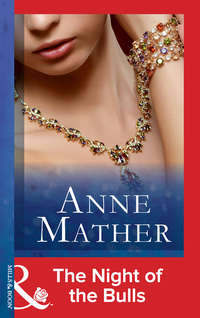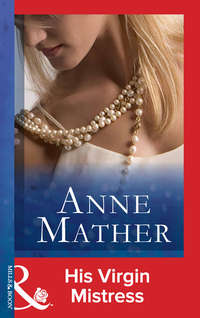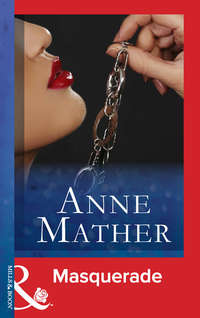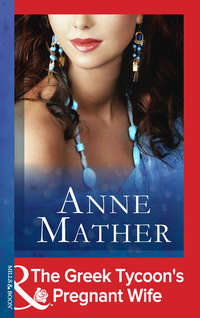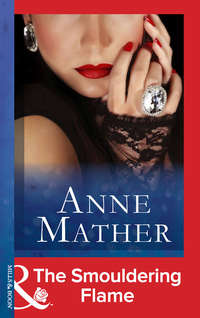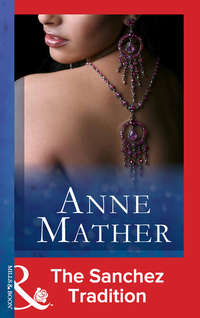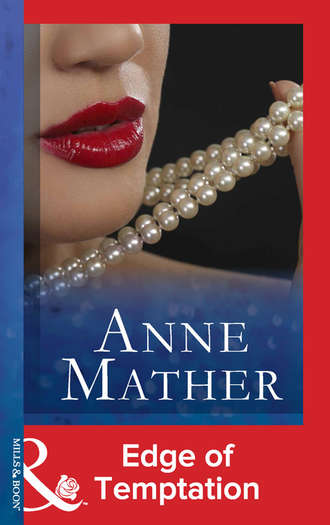
Полная версия
Edge Of Temptation

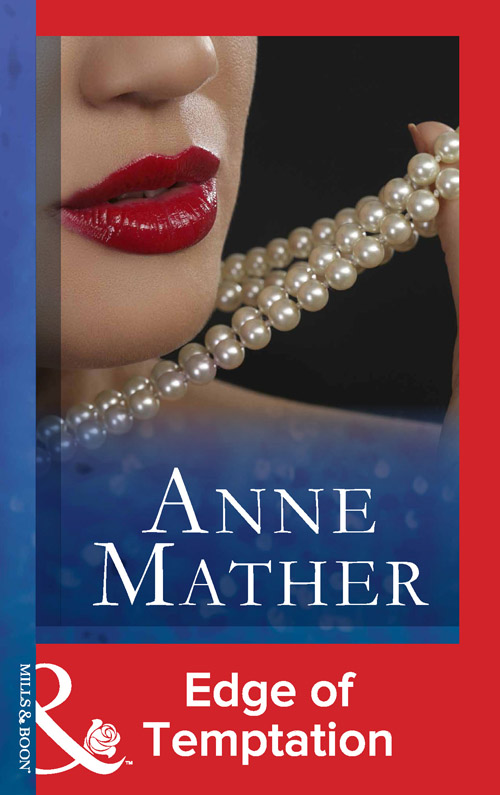
Mills & Boon is proud to present a fabulous collection of fantastic novels by bestselling, much loved author
ANNE MATHER
Anne has a stellar record of achievement within the
publishing industry, having written over one hundred
and sixty books, with worldwide sales of more than
forty-eight MILLION copies in multiple languages.
This amazing collection of classic stories offers a chance
for readers to recapture the pleasure Anne’s powerful,
passionate writing has given.
We are sure you will love them all!
I’ve always wanted to write—which is not to say I’ve always wanted to be a professional writer. On the contrary, for years I only wrote for my own pleasure and it wasn’t until my husband suggested sending one of my stories to a publisher that we put several publishers’ names into a hat and pulled one out. The rest, as they say, is history. And now, one hundred and sixty-two books later, I’m literally—excuse the pun—staggered by what’s happened.
I had written all through my infant and junior years and on into my teens, the stories changing from children’s adventures to torrid gypsy passions. My mother used to gather these manuscripts up from time to time, when my bedroom became too untidy, and dispose of them! In those days, I used not to finish any of the stories and Caroline, my first published novel, was the first I’d ever completed. I was newly married then and my daughter was just a baby, and it was quite a job juggling my household chores and scribbling away in exercise books every chance I got. Not very professional, as you can imagine, but that’s the way it was.
These days, I have a bit more time to devote to my work, but that first love of writing has never changed. I can’t imagine not having a current book on the typewriter—yes, it’s my husband who transcribes everything on to the computer. He’s my partner in both life and work and I depend on his good sense more than I care to admit.
We have two grown-up children, a son and a daughter, and two almost grown-up grandchildren, Abi and Ben. My e-mail address is mystic-am@msn.com and I’d be happy to hear from any of my wonderful readers.
Edge of Temptation
Anne Mather

Table of Contents
Cover
About the Author
Title Page
CHAPTER ONE
CHAPTER TWO
CHAPTER THREE
CHAPTER FOUR
CHAPTER FIVE
CHAPTER SIX
CHAPTER SEVEN
CHAPTER EIGHT
CHAPTER NINE
CHAPTER TEN
CHAPTER ELEVEN
CHAPTER TWELVE
Copyright
CHAPTER ONE
IT was surprising how small the valley looked from the helicopter. Perhaps it was the fact that it was a valley that accounted for that feeling of compression, of compaction, of hills giving on to hills with little between but the restless waters of the Llanbara. The sweeping slopes where he had ridden all his life, the high pastures where Powys herded his sheep and Meredith had his forestry plantation, were telescopically condensed into narrow bands of green and brown, the trees so close the sun could not penetrate. It was an illusion, of course. As the blades of the propellers swept them lower, the rocky outcrop of Morfa Crag could clearly be seen, the sun-dappled hillside a patchwork of shifting shades and shadows, with the roofs of farm buildings clustering together in settlements dotted about the valley floor. Penwyth. His home, and his heritage. And what was it worth?
‘Lead has always been in demand, of course,’ Sir George Marland was saying now, ‘but really, it’s only during the last few years that we’ve turned back on our own resources. I think the oil crisis in 1974 alerted the government to its dependence on other countries for its essential needs, and awakened a kind of national determination to avoid any exploitation of that kind in the future.’
Rafe nodded. In all honesty, he was not paying a great deal of attention to what Marland was saying. Marland was a government official, and like all government officials, in Rafe’s opinion, he said what he had to say in as many words as possible, instead of as few.
‘Man is a hungry individual, Glyndower—some might say greedy. He’s a consumer, and in this day and age, he consumes more than he has ever done before. World mineral deposits are running low. Even the oil we’re presently pulling out of the North Sea may not see us to the turn of the century. We must constantly be on the alert for new sources, new deposits, and lead is a very valuable commodity.’
Rafe glanced at John Norman, his eyes expressive. What did Marland think he was? A moron? He knew the state of the world’s economy—who better, when it was brought home to him constantly in the day-to-day demands of the estate. He knew that cash was in short supply, and that any substantial deposit of ore on his land would benefit him and the country both. Ever since they lifted off, Marland had been expounding in this vein, and quite frankly, Rafe was sick of the sound of his cultivated tones. He didn’t need some pompous bureaucrat implying where his duties lay, explaining the situation to him as if he was some ignorant schoolboy, not conversant with the simple mathematics of economics.
‘I think Mr Glyndower understands your position, Sir George,’ Norman interposed now. ‘However, Penwyth has belonged to his family for many generations, and the farmers—the tenant farmers, that is—–’
‘Farmers!’ Marland’s tones mirrored the contempt he felt for such an interruption. ‘My dear John, the wealth accrued from such land is negligible. What is it? Sheep country at best! There’s your equation. In my view, there is no problem. And let us not forget that it’s Lord Penwyth’s decision, not Glyndower’s.’
‘My father has put the affair into my hands,’ retorted Rafe tersely, pulling a case of the narrow cheroots he smoked out of the pocket of his tweed hacking jacket. When both men declined his offer of the case, he put one of the slim cigars between his teeth, and added: ‘Conversely, I’m of the opinion that there are conflicting interests here. Interests of humanity, and ecology. This country of ours—and I mean Wales, not England, or Great Britain, as it sometimes suits the government to call us—has been torn apart by mining of one sort or another. Pits, spewing slag and slurry all over our hillsides, belching black dust into air that was once clean and pure. Is that an equation, Sir George? Is that what you mean by mineral wealth?’
Marland’s plump shoulders stiffened. He was not used to such plain speaking. His heavy jowls above the starched white collar of his shirt visibly stiffened. Brushing an imaginary speck of dust from the ironed crease in his pin-striped trouser leg, he adopted an air of frosty forbearance.
‘I trust you’re not about to enter that as a serious point of opposition, Glyndower,’ he observed sourly. ‘With your apparent concern for humanity, you should be the first to realise that without the coalmines, the people you so staunchly defend would have starved.’
Rafe put away the lighter he had used to light his cheroot and drew deeply on the tobacco, exhaling a cloud of aromatically-flavoured smoke into the enclosed cabin of the helicopter. He supposed it was impolite of him to smoke in such a confined atmosphere, when neither of his colleagues was doing so, but right now he needed the sustenance it gave him. Lucy would not approve, he knew that, but then there were a lot of things he did of which Lucy did not approve, and at the moment her approval was not in question.
Of course, he knew he had been a fool, bringing up the subject of coalmining. Marland could cut any argument he might make to ribbons, and the humane aspects of rheumatic diseases and silicosis were more than compensated by the rewards offered. Or so it seemed. There were still plenty of men willing to risk life and limb to bring up the energy-bearing carbon, and his own ancestors had not been unwilling to take their fair share of the patrimony offered. It was as well Marland knew nothing of his own history, and besides, what bearing did it really have on what was happening here?
‘I’m simply saying that—enough is enough,’ he replied now, weariness descending like a shroud. ‘I don’t know that in this case, the end justifies the means.’
‘Rafe!’ It was John Norman who spoke, his good-natured features drawn into an uncharacteristic frown. ‘You know perfectly well, Penwyth needs the capital.’
Rafe moved his shoulders impatiently. ‘I don’t deny that. But is that sufficient reason to deny a man his livelihood?’
Marland cleared his throat. ‘I understand that without a—shall we say—substantial investment of capital, the estate may have to be sold any way.’
Rafe stiffened now. ‘Where did you hear that?’ He glanced at John Norman again. ‘Was that your opinion, too?’
The president of the Norcroft Mining Company shifted uncomfortably. ‘One doesn’t have to be a fortune-teller to see for oneself, Rafe,’ he demurred. ‘You’ve said yourself…’
‘We’re going through a rough patch, yes.’ Rafe inclined his head. ‘But it’s been rough before. We’ve survived.’
‘An estate like Penwyth is an anachronism,’ declared Marland heavily. ‘Too small to be efficient, too hilly to farm economically. Who would want this land anyway? Fields and fields of rough turf, climbing among acres of second-rate timber. Pretty, maybe—valuable, it’s not.’
Rafe stilled the ready retort that sprang to his lips. Now was not the time to sentimentalise or offer emotive reasons why he wanted Penwyth to stay the same as it had always been. In all honesty, Sir George was probably right: Penwyth was not a viable proposition. It never had been. The house was a rambling mausoleum, badly in need of roofing and repair, and the acres of garden that surrounded it were gradually running to seed. Old Laurence did what he could, but there was a limit to one man’s abilities in that field, and the man was old—too old to handle a garden like the Manor’s, yet not old enough to pension off. And if they did pension him off, who would take it on? The young people left the valley in search of work in Cardiff or Swansea, and he hadn’t the time to handle it himself. Not along with everything else.
How much easier it had been years ago, he reflected bitterly. The rents from the farms had never contributed much towards the upkeep of the Manor, but in those days, the subsequent lords of Penwyth had had independent means. They had had the money to maintain the valley as an oasis of peace and tranquillity in a world being torn by economic collapse and starvation, money derived from sources it was not always polite to question. They had not been crippled by a series of taxes and death duties, supplemented by rising costs and soaring prices, that left Penwyth almost bankrupt and struggling to survive. Now the rents from the farms were a much-needed necessity, though they went only a small way towards the upkeep of the estate, and his father’s lengthy illness had even eaten into Lucy’s allowance.
‘What would you suggest I tell my tenants?’ he asked Marland now. ‘Like me, they were born and brought up in this valley. They don’t know any other life. It takes some swallowing, doesn’t it? Destroying a whole community!’
‘How many farms are involved? Six? Seven?’ Marland sniffed. ‘You can’t seriously consider the needs of half a dozen families more important than the wealth of the nation as a whole.’
‘How dramatic!’ Rafe’s lips twisted. ‘No, Sir George, I’m not that arrogant—or altruistic. I know what granting exploratory rights means, and I’m aware how important such a find might be.’ He shook his head. ‘It just seems ironic that it was Mervyn Powys who brought that axe to me. He had no idea what it would lead to.’
Marland shrugged. ‘The luck of the game, Glyndower. Now, can we discuss primary claims?’
It was after five before they had completed the aerial survey. The helicopter belonging to the Norcroft Mining Company came down on the field below the manor, and levering himself out beneath the lethal blades of its propellers, Rafe felt it was incumbent upon him to offer his guests some refreshment before they returned to their hotel in Llandrindod Wells. Lucy would expect it, he knew, and besides, he would be interested to have her opinion of Sir George Marland. Lucy was quite a shrewd judge of character, and just because he didn’t like the man, it did not mean he was unlikeable. He was not surprised when his offer was accepted. No definite decision had yet been made, and he knew both Marland and Norman would welcome this opportunity to further their mutual ends.
While the pilot stilled the noisy propellers, Rafe walked towards the Land Rover he had left parked earlier in the afternoon. His dog, a golden-haired Labrador named Rufus, awaited him, sitting patiently in the front of the vehicle, only exploding excitedly when he opened the door.
‘Easy, boy, easy,’ he murmured, fondling the golden head affectionately, as the dog displayed its welcome, and then fastening his fingers around its collar as Sir George and his satellite came importantly across the turf to join them.
‘You sit up front, Sir George,’ urged John Norman, politely climbing into the back, and Rafe’s mouth drew down in a wry curve as he allowed Rufus to bound into the back beside the mining company president.
Sir George used his handkerchief to dust the dog hairs from the seat before joining his host in front, and Rafe turned on the ignition with an inward grimace. He wished he could be done with the whole damn business, without the decision which he knew he was going to have to make.
Penwyth dreamed in the late afternoon sunlight. It was a beautiful house, built on the site of an ancient Cistercian monastery, destroyed in the sixteenth century. Stones from the original building had been used to build the manor house, and from time to time, rumours were spread of a shadowy monk being seen in the grounds, or a certain coldness being felt in various parts of the building. Rafe himself had never seen any ghost, or experienced any sense of chilling as he worked in his study, sometimes late into the night, but the Welsh were a superstitious people, and he respected their beliefs.
The house itself was built of mellowed stone, liberally covered with ivy. It was a constant battle trying to keep the creeping tendrils off the windows, but tinged with the russets and reds of autumn, as it was now, the vine gave the building a warm, welcoming appearance. It was approached beneath a Norman arch, set in a high stone wall, that gave on to a cobblestoned courtyard, where Rafe’s mother had cultivated plants that clung as tenaciously as the ivy to the uneven bricks. Here was honeysuckle and clematis, but late in the year, only the lingering scents of their blossoms remained, like a memory of summer.
Rafe brought the Land Rover to a halt to one side of the ivy-hung porch, and warning Rufus to remain where he was, invited his guests into the house. Sir George was mellowing, too, beneath the undoubted influence of historic architecture, his admiring gaze moving along the mullioned panes that flanked the porch at either side, and John Norman, who had seen it all before, exchanged an encouraging glance with their host.
William Morgan appeared as Rafe entered the hall, his elderly features expressing polite interest in the two men who were following his employer. The old man had been butler at the Manor for more than forty years, since the days when the Glyndowers had employed a housekeeper, too, and not relied on the mistress of the house to perform such menial duties. He was a luxury they could ill afford, Rafe had acknowledged many times, but like Percy Laurence, Morgan was too old to cast adrift.
‘Will you be wanting tea, sir?’ he enquired now, relieving Rafe of his jacket. ‘I believe Mrs Glyndower is in the library. Master Thomas is with her.’
For a moment Rafe forgot the presence of his guests, forgot the unpleasantness of the decision he was going to have to make, and felt only a sense of crushing disappointment.
‘Tom?’ he echoed. ‘Thomas is here?’
‘Yes, sir.’
‘Damn!’
Rafe felt his jaw clenching angrily, and then was reminded of his position once more as Sir George remarked: ‘Capital house you’ve got here, Glyndower. This panelling—magnificent! Seventeenth century, isn’t it? Beautiful.’
‘It’s early eighteenth, actually,’ replied Rafe absently, his mind still buzzing with the implications of his son’s arrival. Then, forcing a politeness he was far from feeling, he added: ‘Part of the foundations date back to the sixteenth century, and there are stone racks in the cellars, which we think were used for storing wine by the monks who used to live in the monastery that originally stood on this site.’
‘Is that so? Fascinating, fascinating …’
Sir George was clearly disarmed by his surroundings, and while he and John Norman shed their sheepskin jackets, Rafe had a swift exchange of words with the butler.
‘When did he arrive?’ he demanded in an undertone, and Morgan wasted no time in pretending he did not know who his employer was talking about.
‘Just after you left, sir,’ he exclaimed, rather reluctantly Rafe felt. Morgan had a soft spot for the youngest member of the household. ‘I—er—I understand he came up from Cardiff by train.’
‘Hitched a ride, you mean,’ muttered Rafe dourly. ‘God Almighty, this is all I need! I don’t suppose his mother was pleased.’
Morgan’s mouth turned down at the corners. ‘No, sir.’
‘I thought not,’ Rafe thrust impatient fingers through the thickness of his hair. Dark, like his Celtic ancestors, it was now streaked with grey, no small contribution coming from the problems Thomas always created.
The opening of the library door brought his silent speculations to a halt. Lucy stood on the threshold, smiling warmly at John Norman, whom she knew, before awaiting her husband’s introduction to Sir George. Not very tall, and slender, with the smallest hands and feet he had ever seen on a woman, Lucy epitomised anyone’s ideal of a well-bred and attractive wife. But, after twelve years of marriage, Rafe now understood why size should never be equated with weakness. Lucy was strong, and determined, and at times she could display the ruthlessness of purpose her father had exhibited in the boardrooms of the Redvers grocery chain. As when dealing with their son, for example …
With the introduction over, Rafe suggested they continued their conversation in the library, and ignoring Lucy’s silent signals to adjourn to his study, he entered the room to find Thomas curled up mutinously on the window seat. His eyes widened hopefully when he saw his father, and then dropped again when he saw he was not alone, and Rafe had no opportunity to speak to him before John Norman saw him, too.
‘Hello, Tom,’ he greeted the boy smilingly, and Thomas was forced to vacate his window seat and come and shake hands with his father’s guests.
‘Hello, sir,’ he acknowledged politely, casting an appealing glance towards his father, and then shook hands with Sir George as he followed the others into the room.
‘This is your son, Glyndower?’ Marland exclaimed, taking a seat on the worn velvet sofa beside the fire, and holding out his hands to the blaze. ‘A fine boy. Isn’t he at school?’
‘He was.’ Lucy spoke, coming into the room after ordering tea, and urging Sir George to remain seated as he attempted to rise. ‘Unfortunately, Thomas doesn’t like work, and this afternoon he arrived home—unannounced.’
‘What my wife means is—this is the third time Tom has run away from his school,’ Rafe put in flatly. ‘Isn’t that right, Tom? You have made yourself absent without leave, haven’t you?’
Tom drew himself up to his full height of some four feet eight inches. At ten years of age, he was quite a tall boy, but so thin Rafe felt he could have snapped him in two.
‘Yes, Father,’ he answered now, making no excuses for his behaviour, and Sir George let out his breath in a puffing sound of disapproval.
‘Won’t do, young man, won’t do,’ he declared, as Lucy came to join him on the couch. ‘We all need to learn, as much as we possibly can these days. And accept discipline. That’s what keeps the wheels of industry turning.’
Tom made no reply, looking to his father for some sign that he at least understood why he had come home, but his mother was still in command.
‘Go along and see your grandfather, Thomas,’ she directed, as Morgan came in with a tray of tea. ‘Talk to him for half an hour. I shall speak to you later.’
Tom’s hesitation was minute, and although Rafe was tempted to countermand the order, he didn’t. But talking to old Lord Penwyth could be a trying business. His father had lapses of memory, a symptom of the disease that had stricken him down five years before, and he was poor company for a small boy.
Still, Tom went obediently out of the room, and Rafe moved to the drinks cabinet. He guessed his guests would prefer something stronger than tea to ward off the chills of the late September afternoon, and he ignored Lucy’s tightening lips when both Marland and Norman accepted Scotch.
With their glasses full, Rafe seated himself opposite his wife, long legs splayed carelessly, considering the mud on his boots with a critical eye. Lucy, as usual, presented an impeccable appearance, and he supposed he ought to be grateful she had her own allowance. Without it, Tom could not have attended his public school—however reluctantly he remained there—or Lucy herself been able to maintain her wardrobe in the manner to which she had become accusomed. This afternoon, her plain mushroom-coloured dress, of fine woollen jersey, proclaimed its exclusiveness in the simple elegance of its lines, and the chestnut darkness of her hair curved softly into her nape, styled by an expert hand. He knew she would not approve of his own informal attire of moleskin breeches and roll-necked sweater, but she would not say so, not in so many words. Like everything else, it would be implied, alluded to, and only aired if his own patience gave out and he brought the subject up.
Realising a conversation was going on around him, Rafe made an effort to pay attention to what was being said. But his thoughts were with his son upstairs, and he longed to go after him and find out why he persisted in disobeying orders like this. So far, all they had been able to get out of him was that he didn’t like the school or being away from home, but Rafe was convinced there was more to it than that. He had not liked boarding school either, but the comradeship and the facilities for sports had gradually compensated for the loneliness he had initially experienced. Of course, he had been older than Tom—twelve, before he left home for the first time—but Lucy found the boy so trying, he had eventually been obliged to consider boarding school as a solution.
‘Rafe! Rafe, did you hear what Sir George said?’
He lifted his head rather blankly to discover Lucy staring at him with scarcely-concealed disapproval. He hadn’t the faintest idea what Marland had said, and she knew it, and with some compunction he made his apologies.
‘I’m sorry,’ he said, the blue eyes which could change so swiftly from sapphire to steely-grey warming in conciliation. ‘I was miles away. What were you saying, Sir George?’
Marland’s sniff was expressive, but Glyndower’s Scotch was good, and he was feeling considerably more mellow. ‘I was just telling your wife, and Norman here, how much I admire this house. Ever thought of selling? I’d guess it would make a tidy sum on the open market.’


